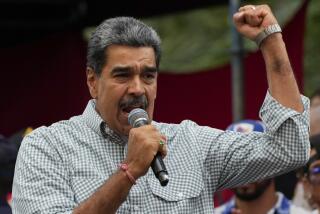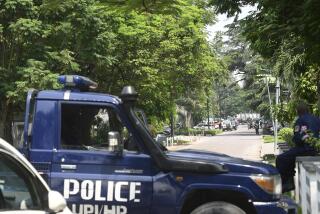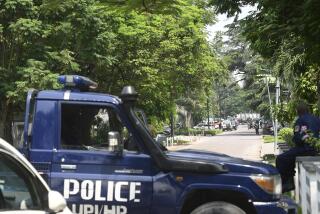U.S. envoys threatened in Zimbabwe
- Share via
JOHANNESBURG, SOUTH AFRICA — A high-speed car chase through the Zimbabwean countryside with police in hot pursuit of U.S. diplomats. A phalanx of armed riot police blocking the Americans’ car. And threats by supporters of President Robert Mugabe to drag the diplomats from their vehicle at a roadblock, burn the car and kill them.
It reads like a script from a Hollywood thriller, but it was real, signifying a new low in U.S. relations with the Mugabe regime.
The government is toughening its security crackdown before a presidential runoff election June 27, but the dramatic cat-and-mouse game Thursday between Zimbabwean security forces and U.S. diplomats left analysts wondering whether the regime cares at this point about its international reputation.
The diplomats had visited the town of Bindura, north of Harare, the capital, collecting firsthand accounts of the regime’s political violence against opposition supporters.
After fleeing police from Bindura, the diplomats said, they encountered spikes at a roadblock outside the town of Mazowe, surrounded by the riot police and war veterans. They said they were threatened and detained for six hours. Their tires were slashed and a Zimbabwean driver with the Americans was beaten, they said. A car sent by the U.S. Embassy in Harare to help also was detained.
The diplomats “were quite frightened, because there were war veterans threatening to burn the car and kill them,” a U.S. diplomat in Harare said.
U.S. State Department spokesman Sean McCormack said, “It is outrageous. It is unacceptable. And while this immediate incident has been resolved, it will not be forgotten.”
Secretary of State Condoleezza Rice said that Washington had protested the incident and that the issue was a matter for the U.N. Security Council.
A Zimbabwean police spokesman told the Associated Press that the diplomats were not threatened. He said police officers simply tried to protect the foreigners from an angry mob.
The diplomats were released after the U.S. ambassador, James McGee, who was not among those detained, contacted the Zimbabwean Foreign Ministry demanding that they be freed.
A British diplomatic vehicle was also initially detained but managed to get away.
“It is an example of the fact that this government doesn’t know any bounds. It flouted all international convention, as well as the protections accorded to diplomats accredited to their country,” McCormack said. “And it is a taste of the kind of oppression and violence that this government is willing to use against its own people.”
The incident came a day after the leader of the opposition Movement for Democratic Change, Morgan Tsvangirai, was held for nine hours after campaigning in a western town, sparking criticism from Western governments and human rights groups. South African President Thabo Mbeki also expressed concern.
The opposition says Tsvangirai won the March election, but the Zimbabwe Election Commission credited him with about 48% of the vote to Mugabe’s 43%, forcing a runoff.
As the Mugabe regime’s crackdown intensifies, few analysts expect a fair second-round vote, nor do they believe that the regime will step down should it face defeat.
“It makes it look like this is emerging as a kind of Burma- or Myanmar-style crackdown that tends to defy all norms in the surrounding region,” said J. Stephen Morrison, director of the Africa desk at the Washington-based Center for Strategic and International Studies, and a former policy planner for the secretary of State.
“There’s a certain amount of nihilism to this, . . . a certain amount of ‘We are getting what we want at whatever the cost.’ ”
Simba Makoni, a former Mugabe backer who defied the ruler by running against him in the presidential election, told Reuters news agency Thursday that the runoff should be canceled to avoid further violence and bloodshed. Makoni won 8% of the first-round vote.
Thursday’s diplomatic incident was similar to one several weeks ago in which Ambassador McGee and his British counterpart were detained at a roadblock after visiting victims of political violence in a hospital. McGee was later called in and reprimanded by Zimbabwean authorities and has since been threatened with expulsion by Mugabe.
All humanitarian operations by nongovernmental organizations and aid agencies were suspended Thursday by the regime, which accused them of supporting the opposition. The ban will have far-reaching effects, with a third of the population dependent on international food aid.
And this week, three South Africans were sentenced to six months in jail after they were caught with television equipment belonging to Britain’s Sky News. The government has refused accreditation to most foreign news media and requires registration of broadcast equipment.
--
More to Read
Sign up for Essential California
The most important California stories and recommendations in your inbox every morning.
You may occasionally receive promotional content from the Los Angeles Times.










